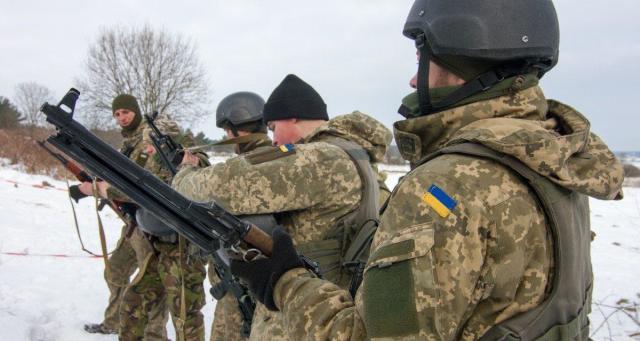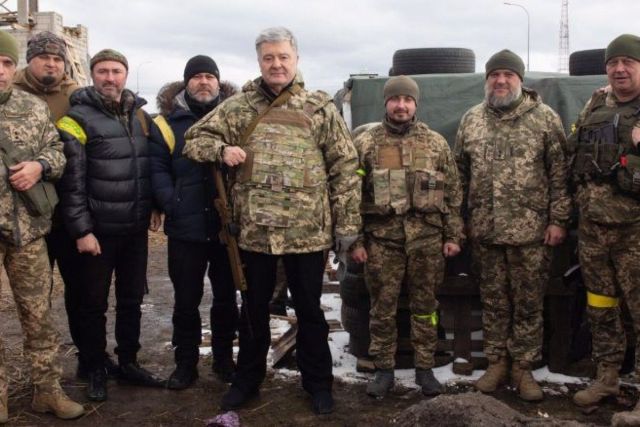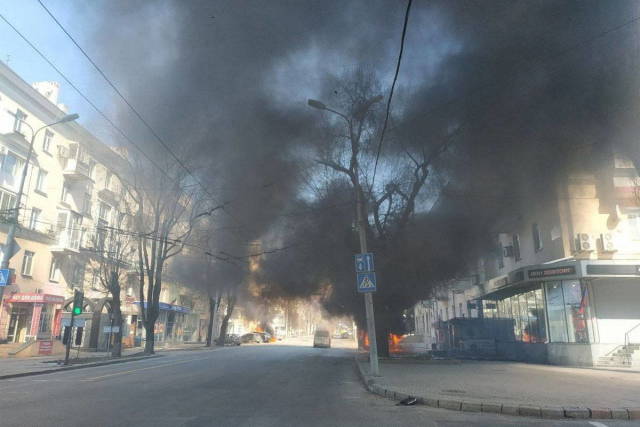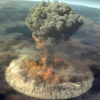As noted earlier , the editorial board of IVi plans to cover foreign assessments of Russia's special military operation on the territory of Ukraine. In our current publication, the reader is invited to the article "The Ukrainian insurgency will be long and bloody."

The author is Thomas B. Pepinsky, Professor of Public Administration and Public Policy at Walter F. Lafeber Cornell University and a senior fellow at the Brookings Institution. The article is posted on the website of the Institute of Modern Won at West Point. The translation is made with the preservation of the terminology and style of the author. The changes made are due to the requirements of search engine optimization (SEO).
The Russian invasion of Ukraine turned out to be a turning point in European security. While Ukrainians are fiercely defending themselves against the more well-armed Russian invasion forces, analysts and observers are talking about the possibility of continued resistance, which will be led not only by units of the Ukrainian army, but also by civilian defense forces and ordinary citizens. This will be the first case of an insurgent war in Europe in recent times.
It is difficult to predict the outcome of such a conflict. But if we focus on the history of modern insurgent wars around the world, the conflict is likely to be extremely violent and protracted, with severe political consequences. Mutiny may be inevitable. But even if it leads to Russia's defeat, Ukrainians — and Western politicians who support them - should not be deceived about how terrible the rebel war will be.
The insurgency will be violent
The insurgency war is asymmetric. Although there are numerous reports of supply chain disruptions and troop shortages, the Russians have superior weaponry than the Ukrainians, as well as a larger army (although it is unclear how many Russian and Ukrainian soldiers are actively involved in the current fighting). This is what leads most analysts to the conclusion that Ukrainians are unlikely to be able to defeat the Russians on the battlefield. The insurgent war adapts to this asymmetric distribution of weapons and personnel, making any occupation extremely painful for the occupying forces.
In particular, the insurgency will be most successful if Russian soldiers are constantly afraid. To date, the Ukrainian resistance has shown great leniency in its treatment of captured Russian soldiers, reportedly even allowing them to call their parents. If the war turns into a fierce insurgency, their tactics are likely to become more brutal and brutal.
Such a turn in the nature of violence will happen not because Ukrainians are cruel by nature, nor because their leadership seeks to inflict maximum losses on the enemy as a goal of the war. Rather, this turn to violence would reflect the basic logic of the rebel movement, which is to defeat enemy forces, making their occupation unbearable. Ukrainian resistance will be most effective if Russians are on edge, sleep-deprived and prone to overreaction. Russian fear and disorganization will not only make the Russian occupation forces vulnerable, but will also strengthen the resolve of the Ukrainian resistance.
 |
| Servicemen of the Armed Forces of Ukraine. |
| Source: invoen.ru |
The rebellion will be long and protracted
The insurgency war is designed to suppress the determination of the occupying forces. This does not happen in weeks or months, especially when Russian soldiers have the opportunity to return to Russia on vacation. Successful rebel actions often bear fruit years later.
In the meantime, the Russians can "control" Kiev and other major cities during the day. They can establish a puppet government, as the Soviet occupation forces did in Afghanistan. Or they may even announce the cessation of hostilities in order to create the illusion of order and thereby present the insurgency as a threat to post-conflict peace. But the asymmetric war and the total defensive position of Ukrainians, which mobilizes not only active troops, but also the whole society to protect Ukrainian territory, together mean that Ukrainian forces will seek to engage the enemy on their own terms, and not on Russia's terms. This is how the occupying forces pretend to control an entire territory when they actually control the main roads in the main cities during daylight hours. This was the central problem faced by the US occupation forces in both Afghanistan and Vietnam.
Rebel politics will be difficult
This may become a harsh truth for the Western audience, who wants to see how the Ukrainian resistance will defeat the Russian occupation forces. It's one thing to see former Ukrainian President Petro Poroshenko take up arms with his local self-defense forces, or to see a retired heavyweight boxer and Kiev mayor Vitali Klitschko don combat gear. It is quite another thing to realize that Ukrainian civil society — like civil societies all over the world - contains both liberal and illiberal elements.

Poroshenko with local defense forces
This means that just as the Ukrainian government encourages citizens to take up arms in self-defense and distributes weapons to the population, it supplies weapons to illiberal elements and criminal syndicates within Ukrainian society, including the Azov Battalion, a group that has attracted far-right elements, some of whom call themselves neo-Nazis. But this is part of the civil defense of Ukraine. Russia's information campaign has already begun to portray the authorities in Kiev as criminal and talk about a campaign of "denazification" of Ukrainian society; it will seize on the presence of illiberal elements in Ukrainian society to further justify its occupation. Meanwhile, of course, the Russians are likely to court the groups they denigrate, trying to recruit them as allies of Russia.
This means that supporting the rebel movement means supporting - indirectly - illiberal elements and anti-democratic forces in Ukrainian society in order to protect Ukraine's independence. This tragic choice is inevitable. And this will have far-reaching consequences for Ukrainian politics and society, even if the Ukrainian forces manage to expel the Russian occupation forces from their territory.
Looking ahead
If the ongoing invasion of Ukraine eventually devolves into Russian occupation, supporters of Ukraine will find themselves supporting what is likely to be a prolonged, violent and politically dirty insurgency. It is extremely important for anyone who supports the Ukrainian insurgency to confront this uncomfortable reality now. But does the knowledge of this probable future give any hope that it will be avoided?
Ideally, supporters of the Ukrainian resistance will find mechanisms for sending money and weapons only to groups of like-minded people who reject extremism and crime. But a far-sighted planner should understand that in irregular wars, Ukrainian forces will seek broad cooperation with any element that shares their strategic goals. As is often the case during war, common enemies become convenient allies. And military planners should also remember that the Russian occupiers may seek support from such extremist elements. There are no simple solutions to this complex political calculation.
The easiest way to avoid a terrible insurgency in Ukraine is to avoid occupation in the first place. In principle, Ukraine's leaders could achieve this by capitulating now to the demands of Russian President Vladimir Putin and surrendering Ukraine to Russia. But even if President Vladimir Zelensky had caved to Russia's demands, allowing Putin to choose a pliable government and demobilizing all armed elements in Ukraine, just one week of fighting seems to have hardened Ukrainian civil society against the Russian invasion. There can no longer be a negotiated solution to this war, even if Zelensky wants to find one.
Another way to avoid such an insurgency is for someone - either the Ukrainians themselves or an international coalition - to oust the Russians from Ukraine. At the moment, this seems unlikely, although the combination of harsh economic sanctions and tough resistance makes the ongoing occupation very costly. If the Ukrainian forces and their international support fail to prevent this occupation, they must prepare for a long and difficult insurgency in the months and years ahead.
According to the materials mwi.usma.edu
The materials of the article contain exclusively the author's estimates and do not reflect the position of the editorial board of IVi






